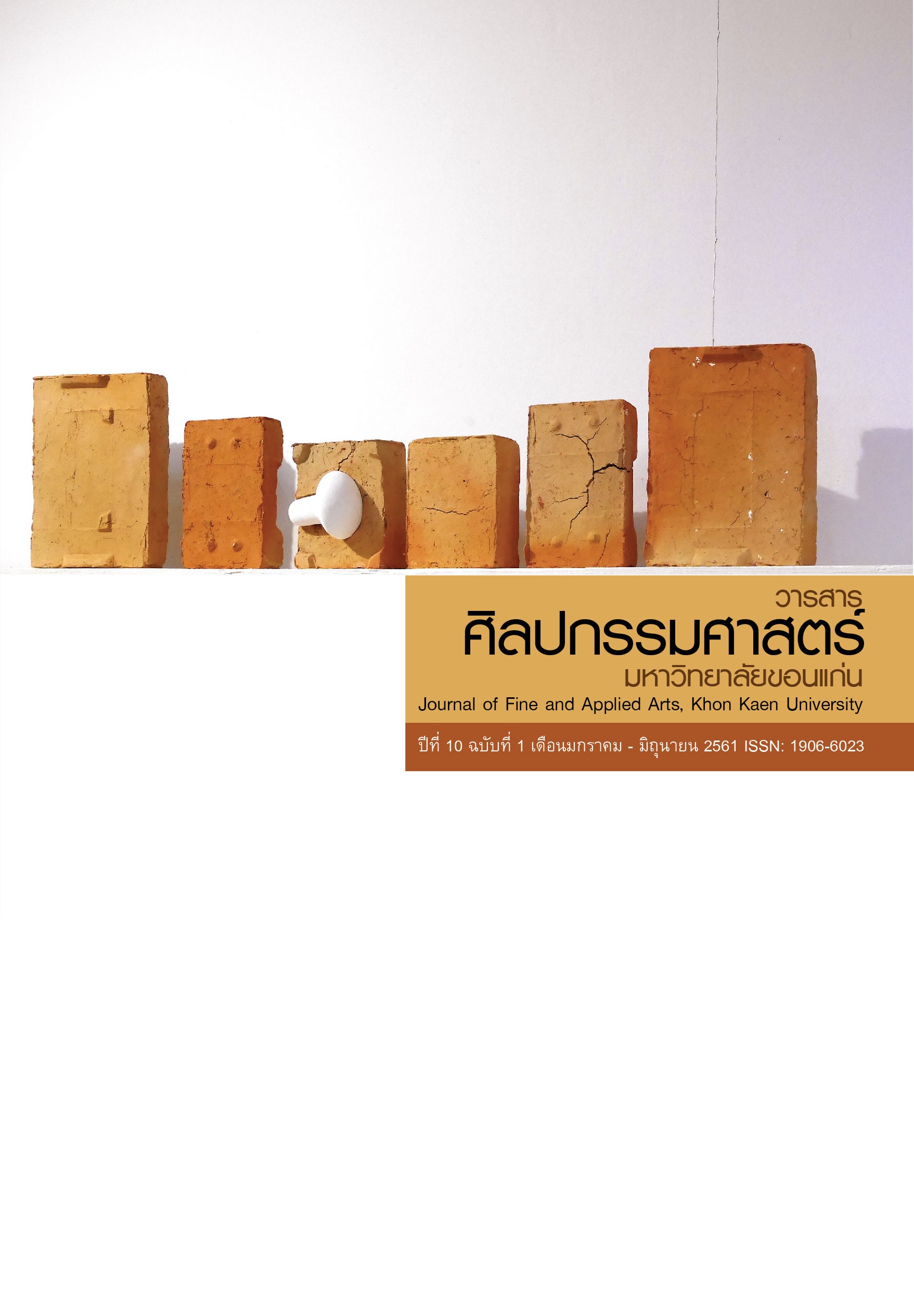กลองยาวในวิถีวัฒนธรรมของชาวอำเภอวาปีปทุม จังหวัดมหาสารคาม
Main Article Content
บทคัดย่อ
กลองยาวในวิถีวัฒนธรรมของชาวอำเภอวาปีปทุม ผลการศึกษาพบว่า การละเล่นกลองยาวของชาวอำเภอวาปีปทุม จังหวัดมหาสารคาม เกิดขึ้นมาตั้งแต่โบราณและเล่นสืบต่อรุ่นต่อรุ่นกันมาโดยตลอด จนกระทั่งมานิยมเล่นกันมากเมื่อมีการประกวด กลองยาวในงานประเพณีออนซอนกลองยาวชาววาปีของดีพื้นบ้านเมื่อปี พ.ศ. 2539 เป็นต้นมาสภาพปัจจุบันการละเล่นและการแข่งขันทางวัฒนธรรม ที่มีผลกระทบต่อเศรษฐกิจ สังคมและวัฒนธรรม อำเภอวาปีปทุม จังหวัดมหาสารคาม ด้านการผลิต กลองยาว กลุ่มผู้ผลิตกลองยาว 4 กลุ่ม คือ 1) นายเที่ยง พิณทะปะกัง 2) กลุ่มผลิตกลองยาวบ้านตลาด 3) กลุ่มผลิตกลองยาวบ้านโคก 4) กลุ่มผลิตกลองยาวบ้านจอกขวาง การผลิตกลองยาวในยุคแรก ใช้วิธีการผลิตแบบภูมิปัญญาชาวบ้าน คือไม่มีเครื่องจักรมาใช้ในการทำงาน ต่อมาได้พัฒนาโดยการ นำเครื่องจักรเข้ามาใช้ ทำให้กลองยาวได้คุณภาพและมาตรฐานมากขึ้นจนเป็นที่ต้องการของ คณะกลองยาวด้านการแสดงวัฒนธรรมกลองยาว ปัจจุบันพบว่ามีจำนวนมากกว่า 15 คณะ สำหรับโอกาสในการแสดงกลองยาวนั้นพอสรุปได้ 2 ลักษณะ คือ แห่นำขบวนในงานบุญหรือ งานประเพณี แห่กัณฑ์หลอน แห่กฐิน แห่ผ้าป่า แห่นาค แห่ในงานรื่นเริงของแต่ละท้องถิ่น กับแสดงในโอกาสประกวดหรือแข่งขัน โดยเฉพาะงานประเพณีออนซอนกลองยาวชาววาปีของดี พื้นบ้านเป็นประจำทุกปี
Article Details
เนื้อหาและข้อมูลในบทความที่ลงตีพิมพ์ในวารสารคณะศิลปกรรมศาสตร์ มหาวิทยาลัยขอนแก่น ถือเป็นความคิดเห็นและความรับผิดชอบของผู้เขียนบทความโดยตรง ซึ่งกองบรรณาธิการไม่จำเป็นต้องเห็นด้วย หรือร่วมรับผิดชอบใด ๆ
บทความ ข้อมูล เนื้อหา รูปภาพ ฯลฯ ที่ได้รับการตีพิมพ์ในวารสารคณะศิลปกรรมศาสตร์ มหาวิทยาลัยขอนแก่น ถือเป็นลิขสิทธิ์ของวารสารคณะศิลปกรรมศาสตร์ มหาวิทยาลัยขอนแก่น หากบุคคลหรือหน่วยงานใดต้องการนำทั้งหมดหรือส่วนหนึ่งส่วนใดไปเผยแพร่ต่อหรือเพื่อกระทำการใด ๆ จะต้องได้รับอนุญาตเป็นลายลักอักษรจากวารสารคณะศิลปกรรมศาสตร์ มหาวิทยาลัยขอนแก่น ก่อนเท่านั้น
เอกสารอ้างอิง
เจริญชัย ชนไพโรจน์. (2526). ดนตรีและการละเล่นพี้นบ้านอีสาน. มหาสารคาม : มหาวิทยาลัย ศรีนครินทรวิโรฒ มหาสารคาม.
นิยพรรณ (ผลวัฒนะ) วรรณศิริ. (2540) มานุษยวิทยาสังคมและวัฒนธรรม. พิมพ์ครั้งที่ 1 พิมพลักษณ์.กรุงเทพฯ : มหาวิทยาลัยเกษตรศาสตร์.
บุญโฮม พรศรี. (2543). พิณอีสานการเปลี่ยนแปลงทางวัฒนธรรม กรณีศึกษาจังหวัดอุดรธานี.วิทยานิพนธ์ ศศ.ม. มหาสารคาม : มหาวิทยาลัยมหาสารคาม.
ประเวศ วะสี. (2541).ประชาคมตําบล. กรุงเทพมหานคร: สํานักพิมพ์มติชน.
ปุสตี มอนซอน และคณะ. (2546).กรอบแนวคิดในการประเมินศักยภาพเครือข่ายสังคม. กรุงเทพฯ :เอกสารประกอบการประชุมเพื่อพัฒนาการเรียนรู้ในการขับเคลื่อนโครงการวิจัยชีวิตสาธารณะท้องถิ่นน่าอยู่, สนับสนุนโดยสำนักงานกองทุนสนับสนุนการเสริมสร้างสุขภาพ.
ปรียา หิรัญประดิษฐ์. (2542). “ศิลปะการละเล่นและการแสดงพื้นบ้านในสังคมไทย” ใน ศิลปะการละเล่นพื้นบ้านของไทย. หน้า 1 – 74. นนทบุรี : มหาวิทยาลัยสุโขทัยธรรมาธิราช.
รัญจวน อิศรานุวัฒน์. (2542). กลองยาวของชาวอำเภอศรีสมเด็จ จังหวัดร้อยเอ็ด. วิทยานิพนธ์ ศศ.ม. มหาสารคาม : มหาวิทยาลัยมหาสารคาม.
วรวุฒิ โรมรัตนพันธ์. (2548). ทุนทางสังคม. กรุงเทพฯ : โครงการเสริมสร้างการเรียนรู้เพื่อชุมชนเป็นสุข.
สมบัติ ทับทิมทอง. (2544). สภาพการดำรงอยู่ของคณะกลองยาวอำเภอวาปีปทุม จังหวัดมหาสารคาม. ปริญญานิพนธ์ ศศ.ม. มหาสารคาม : มหาวิทยาลัยมหาสารคาม.
สุจิตต์ วงษ์เทศ. (2532).“ร้องรำทำเพลง : ดนตรีและนาฏศิลป์ชาวสยาม,” ศิลปวัฒนธรรม ฉบับพิเศษ.หน้า 109-116, กรุงเทพฯ : โรงพิมพ์พิฆเณศ.
สุมิตรา ทองพูล. (2554). วัฒนธรรมกลองยาว : การแข่งขัน การอนุรักษ์ และพัฒนาเพื่อส่งเสริมเศรษฐกิจ สังคมและวัฒนธรรม อำเภอวาปีปทุม จังหวัดมหาสารคาม. วิทยานิพนธ์ ศศ.ม. มหาสารคาม : มหาวิทยาลัยมหาสารคาม.
สุรัตน์ วรางค์รัตน์.(2529). “เส็งกลอง ลายกลองอีสาน,” ศิลปวัฒนธรรม. 7(7) : 105- 113 ; พฤษภาคม.
หนามคอม.(นามแฝง)(2534). “กลองยาว,” ศิลปากร. 34(6) : 50 ; มิถุนายน.


